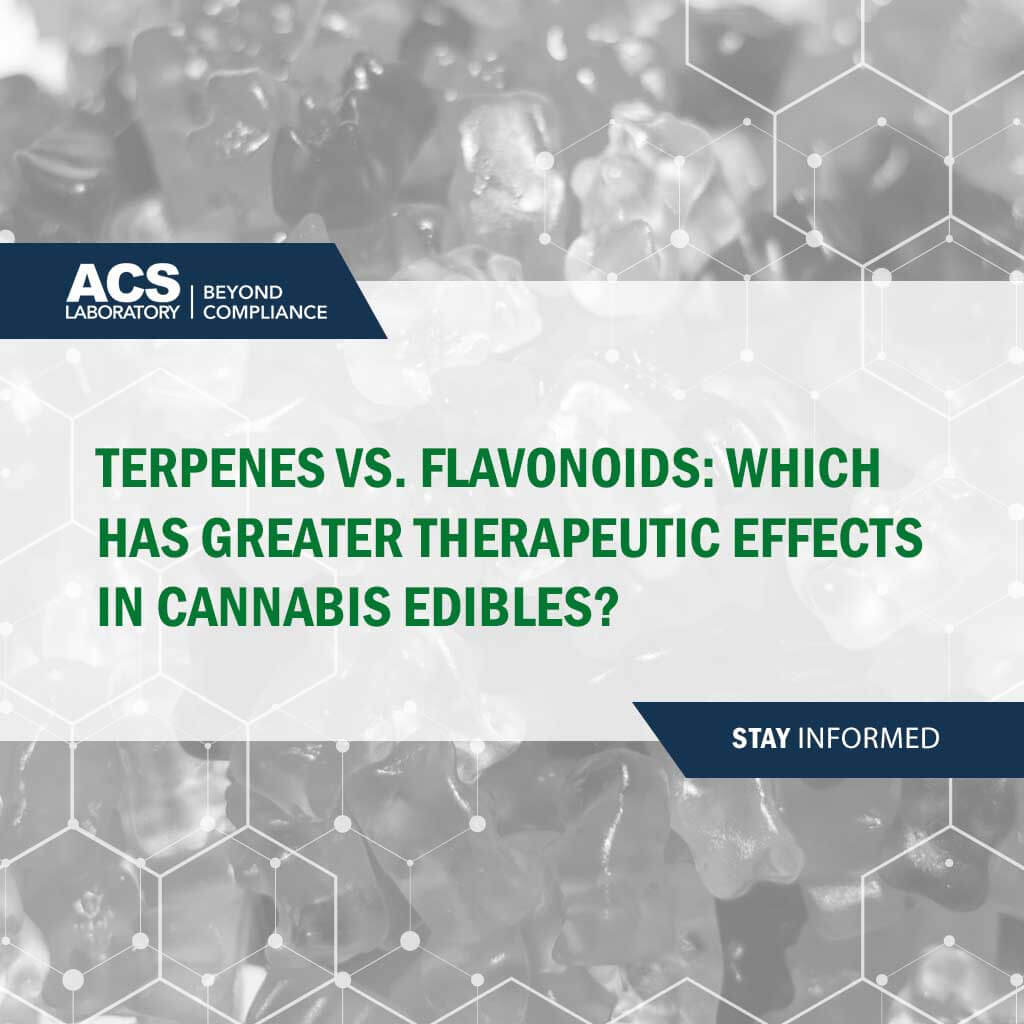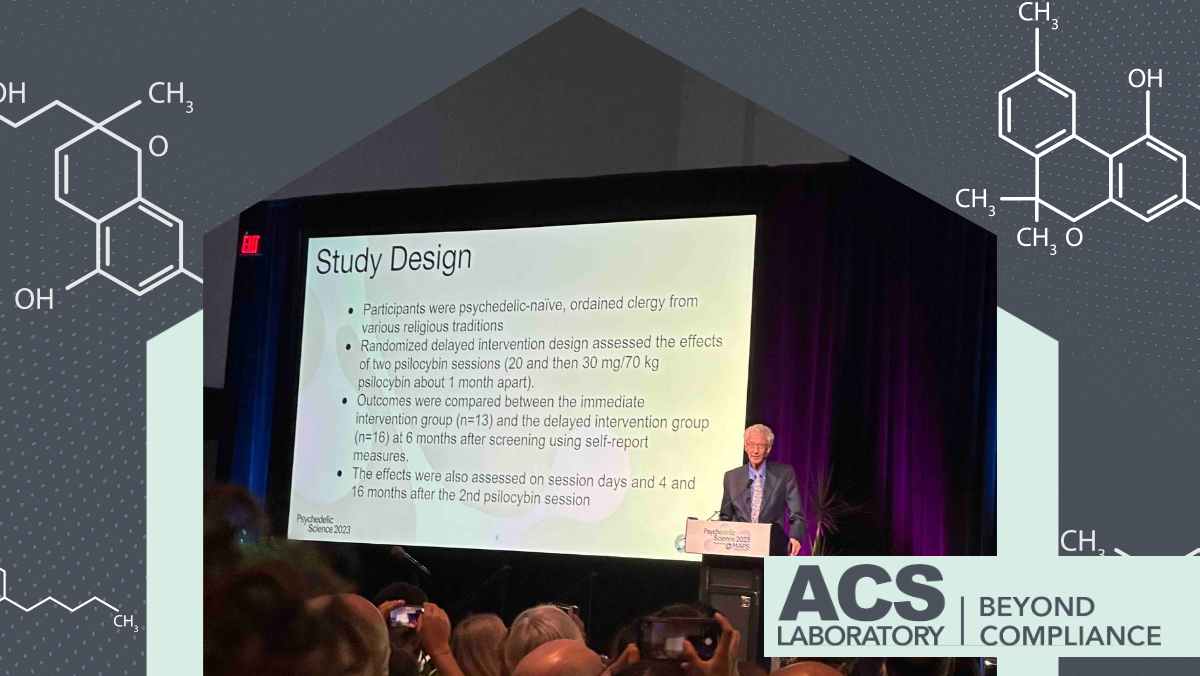Terpenes vs. Flavonoids: Which Has Greater Therapeutic Effects in Cannabis Edibles?
In this post:
- What are Terpenes?
- How Do Terpenes Alter the Effects of Cannabinoids?
- What is the Effect of Terpenes in Edibles?
- What Don't Edibles Normally Contain Cannabis-based Terpenes?
- What About Flavonoids?

The resounding theory by cannabis researchers is that the whole plant works better than its individual parts. In other words, you get more benefits from consuming the full spectrum of cannabinoids, terpenes and flavonoids than you would from CBD or THC alone. That theory is known as the “entourage effect.”
But does the concept also apply to edibles? Here we explore the entourage effect and how the “neglected pharmacological treasure trove” of terpenes may be the key to a more dynamic edible experience.

What are Terpenes?
Before we get into the weeds of the debate, let’s review what terpenes are exactly. These organic compounds are not unique to cannabis. In fact, terpenes are found in almost every flower, herb and fruit, providing plants with their unique scents and flavors.
They are what we consider “essential oils.”
Terpenes also have wellness benefits and physiological effects. For example, terpenes such as Myrcene, Linool and Terpinolene are known for their relaxing effects. Alpha-pinene and Limonene, on the other hand, are known to be more uplifting.
But that’s not all. In addition to their individual effects, cannabis-derived terpenes have been shown to interact with the body’s endocannabinoid system to modulate or control the high. While terpenes and cannabinoids have their own individual benefits, they are considered to be much more effective together with cannabinoids.

How Do Terpenes Alter the Effects of Cannabinoids?
Busting the Indica-Sativa Myth
Each cannabis strain contains different terpenes, which accounts for the variety of psychoactive effects, according to popular theory. So, even if two strains share the same amount of THC, one might make you feel lethargic, while the other might make you laugh until your face hurts. This is largely due to the composition and concentration of the terpenes they contain.
Prior schools of thought attributed these differences to whether you were smoking an indica or sativa variety. But as scientists have researched more, they’ve come to discover that terpene profile rather than the size, texture and origin of the plant has much more of an effect on the type of high you experience. This is known as the entourage effect.
The Entourage Effect
In addition to affecting your mood and energy levels, evidence has shown that terpenes may be “antidotes to the intoxicating effects of THC that could increase its therapeutic index.”
So, the entourage effect isn't just about how terpenes modulate your high. It’s also about how these aromatic compounds intermingle with cannabinoids in the endocannabinoid system to enhance your health and wellness benefits.
In 2011, board-certified neurologist and cannabis researcher Ethan Russo drafted a scientific review with numerous examples. In the paper, he reviews how cannabinoids and terpenes can synergize to support the treatment of pain, inflammation, sleep disorder, depression and acne, to name a few. In the case of cannabis and acne, Russo’s research purports that high doses of CBD combined with the citrus terpene, Limonene, and lavender terpene, Linalool, may be a winning combination.
What is the Effect of Terpenes in Edibles?
Based on the knowledge of terpenes’ flavor, fragrance and therapeutic effects, you can logically surmise that terpenes will alter the effects of cannabinoids in edibles. But when it comes to eating cannabis, you also have to consider the bioavailability factor.
According to cannabis educator Emma Chase, you need to look at how many terpenes make it into the blood plasma through oral ingestion to determine the extent of their effect. According to Chase, studies have shown that, aside from the heavier molecules, most terpenes don’t make it through into the plasma. But that doesn’t mean they can’t interact with receptors on their way through your digestive tract to your liver, where they’re metabolized before the cannabinoids reach the bloodstream.
Moreover, studies have shown that terpenes appear in your sweat. This all means they are definitely going somewhere in the body, and likely having an effect on how you feel and how your endocannabinoid system is responding.
The problem is we don’t have human clinical trials that definitively connect the variety of experiences on edibles to the cannabinoids and terpenes they contain. We can only predict that current evidence supports a more dynamic experience.
Why Don’t Edibles Normally Contain Cannabis-Based Terpenes?
Raw cannabis won’t get you high just from eating it. So, in order to make edibles, you need to heat the plant to make the cannabinoids active. But when you do that, you also destroy most of the terpenes, which are highly volatile.
As such, edibles typically lack the full spectrum of terpenes that provide the aromas, tastes or effects associated with the strain. Many brands are working around this issue by infusing non-cannabis, botanically derived terpenes into their edibles to mimic the original profile of the strain.
Many old-schoolers dislike this modified approach, but botanical terpenes are much easier to work with and reportedly contain the same chemical properties as their cannabis counterparts.
What About Flavonoids?
As you explore the benefits of fusing terpenes with cannabinoids, you must also be aware of flavonoids. Like terpenes, flavonoids are not exclusive to marijuana plants. In fact, flavonoids are found in most fruits and vegetables, and are responsible for their bright pigments.
Wines, cocoa and berries all contain these healthy chemicals. Flavonoids have also been shown to exhibit therapeutic properties.
Similar to terpenes and cannabinoids, flavonoids bind with receptors in the body to exhibit antioxidant and anti-aging effects. In addition to being endocannabinoid-system receptors, flavonoids also bind to your opioid receptors, which contributes to significant pain-relieving properties, among others. In fact, two flavonoids, cannflavin A and cannflavin B, have been shown to be up to 30 times more powerful aspirin!
This is a unique benefit you can’t get from cannabinoids and terpenes alone. Eating cannabis is a great way to get the benefits of flavonoids. However, cannflavins make up a minuscule amount (0.014%) of the plant’s matter. This makes them extremely challenging and cost-prohibitive to produce.
Moreover, flavonoids have limited oral bioavailability due to their structure. Luckily, there’s always a scientific solution, such as extracting flavonoids from fruits and vegetables, and infusing them in cannabis recipes. Some scientists have even figured out how to metabolically engineer these flavonoids without growing the whole plant. Stay tuned for more advancements in research surrounding how to use flavonoids in more targeted, effective ways.
So, Do Terpenes and Flavonoids Work Better in Edibles Than Cannabinoids Alone?
While bioavailability challenges may temper the effects of these added compounds, our short answer is still yes. Terpenes and flavonoids have the potential to contribute flavor, fragrance, color and therapeutic properties that you can’t get from cannabinoids alone. And in the case of terpenes, you may even be able to hand-pick the type of high you want by the profile of essential oils you select.
So, why not add a little more natural flavor to your cannabis-based snacks?

About ACS Laboratory
ACS Laboratory is The Most Trusted Cannabis and Hemp Laboratory in the USA™. Founded in 2008, ACS Laboratory is DEA licensed, AHCA licensed, an ISO17025 accredited and CLIA accredited laboratory with the largest state-of-the-art testing facility in the eastern USA. USDA compliant and officially a “Designated Compliance Laboratory” by the Florida Department of Agriculture and Consumer Services Division of Plant Industry (FDACS/DPI), as well as a “CMTL” (Certified Marijuana Testing Lab) by the Florida Department of Health Office of Medical Marijuana Use (OMMU).
The laboratory uses state-of-the-art, ultra-high performance liquid chromatography-tandem mass spectrometry (HPLC/LCMS, GC/MS and ICP/MS) technology and has developed proprietary testing methodologies which created enhanced detection ability and improved accuracy.
ACS Laboratory’s 20,000-square-foot, state-of-the-art facility is located outside of Tampa, at 721 Cortaro Dr., Sun City Center, FL 33573.
For more information, visit acslabcannabis.com or call (813) 670-9157.
Watch this video on what ACS Laboratory tests and read its blog for up-to-date information on cannabis science and lab testing for both the hemp and cannabis industries.




.jpeg)
.jpeg)
.jpeg)
.jpeg)

.png)
.png)
.png)
.png)
.png)